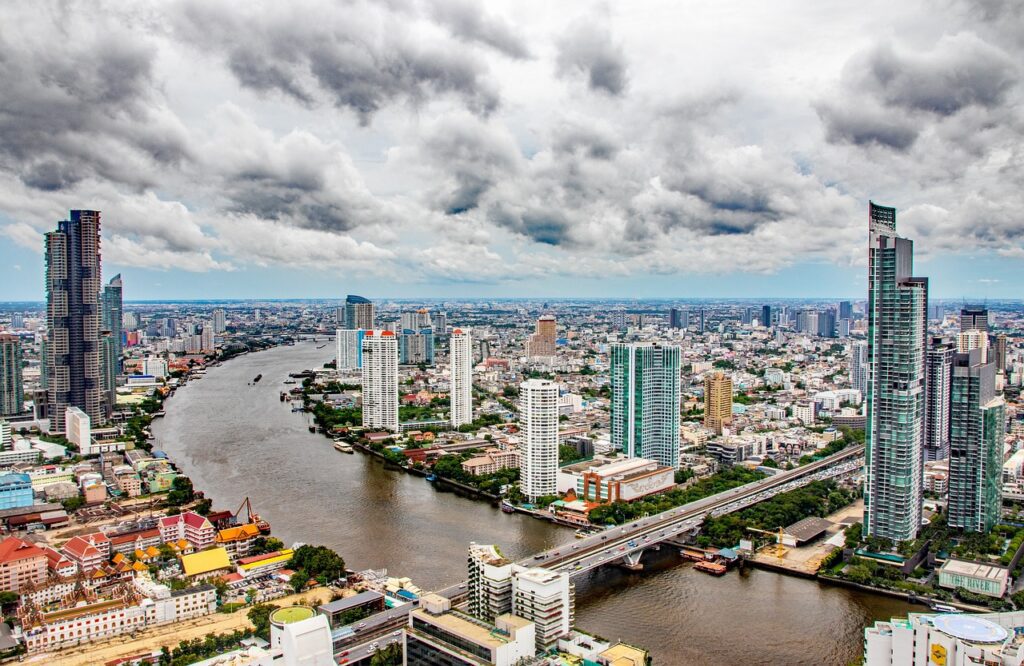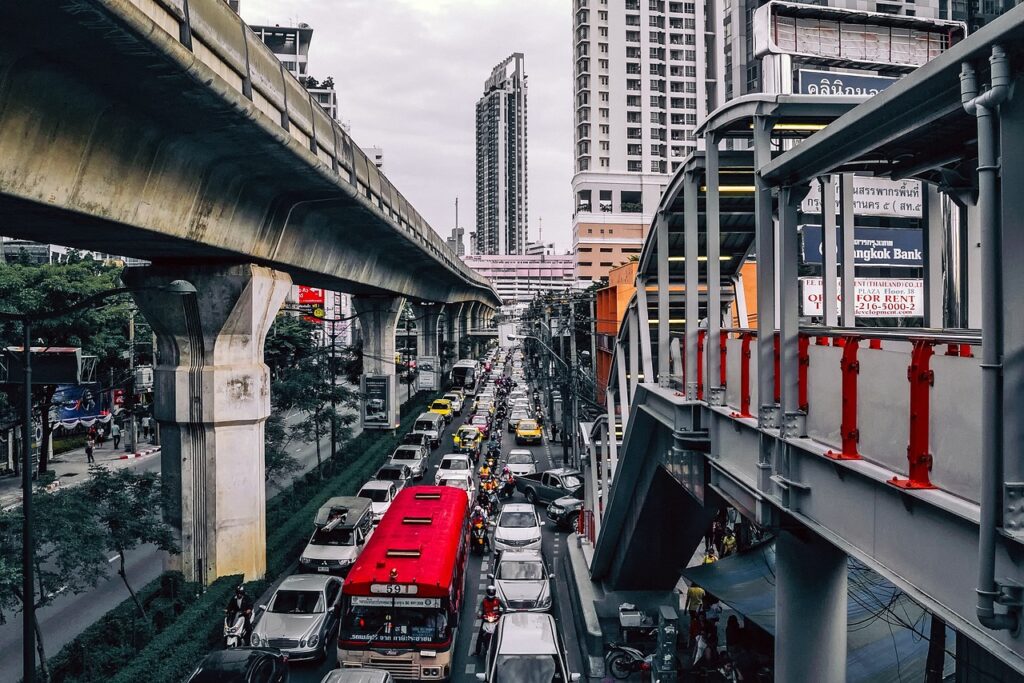Thailand, with its booming economy and rich cultural landscape, has become an attractive destination for expats looking to build their careers. Whether you’re eyeing a corporate job in Bangkok or a teaching position in one of the country’s tropical paradises, working legally in Thailand requires obtaining a work permit. This process may seem daunting, but by understanding the steps involved and the legal requirements, you can avoid common pitfalls and set yourself up for a smooth transition into your new role.

In this guide, we’ll break down the entire process of securing a work permit in Thailand—from the necessary documentation and employer obligations to navigating legal restrictions. Following this roadmap will help ensure you can start your new job without any legal hiccups and with full peace of mind.
What is a Work Permit?
A work permit in Thailand is a crucial legal document that grants a foreign national the right to work within the country, but only under a specific employer and in a particular position. Issued by the Thai Ministry of Labour, this permit is mandatory for any foreigner planning to engage in employment, whether it’s full-time or part-time. The work permit not only legally formalizes your employment status but also outlines the duties, work location, and other job-specific details that must be adhered to.
Working in Thailand without a valid work permit is illegal, and the consequences can be severe. Foreign nationals found working without one risk facing penalties that may include fines, deportation, and, in some cases, imprisonment. Moreover, employers who hire foreigners without proper authorization are also subject to significant legal repercussions.
The work permit essentially safeguards both the foreign worker and the employer by clearly establishing the foreigner’s role within the Thai labor market. Once issued, the permit must be carried at all times while working, as labor inspectors or police may request to see it. If your job or employer changes during your stay in Thailand, a new work permit or modification to the existing permit will be required.
Understanding the importance and legal necessity of obtaining a work permit before starting work in Thailand is essential. This document ensures that foreign workers are protected under Thai law, granting them access to certain rights, including social security benefits and legal protections in the workplace.
Eligibility Criteria for a Thai Work Permit
Before applying for a work permit in Thailand, it’s essential to ensure you meet the eligibility criteria established by the Thai government. Understanding these requirements helps avoid potential delays or rejections during the application process.
Visa Requirements
The first crucial step toward obtaining a work permit in Thailand is securing a valid Non-Immigrant Visa (Non-B Visa). This visa, typically issued by a Thai embassy or consulate in your home country, allows you to stay in Thailand for up to 90 days. The Non-B Visa is specifically designed for individuals intending to work or conduct business in Thailand.
It is important to emphasize that you cannot apply for a work permit if you are in Thailand on a tourist visa. Attempting to convert a tourist visa into a work permit is not allowed under Thai law. Therefore, securing a Non-B Visa is an essential prerequisite for the work permit application. Once you have this visa, you are eligible to proceed with the work permit process while in Thailand.
If you are already in Thailand, it’s possible to extend your Non-B Visa to a one-year visa once your work permit has been issued, making the Non-B Visa the gateway to legal employment.
Employer Sponsorship
Another key requirement for obtaining a Thai work permit is having employer sponsorship. Your prospective employer must be registered in Thailand and willing to act as your sponsor throughout the work permit application process. Under Thai law, employers who hire foreign nationals must comply with specific conditions, which include:
• Paid-up capital: The company must have a paid-up capital of at least 2 million Thai Baht for each foreign worker they employ. This rule ensures that only financially stable companies can sponsor foreign employees.
• Employment of Thai nationals: For every foreign employee hired, the company must employ at least four Thai nationals. This regulation aims to ensure that Thai citizens continue to benefit from local employment opportunities.
• Reserved professions: Certain jobs, such as those in agriculture, construction, and retail, are legally reserved for Thai citizens only. Foreign nationals are prohibited from working in these restricted professions. It’s vital to verify that your intended position does not fall into one of these categories before applying.
Employers are responsible for providing the necessary supporting documents, including financial records, tax documents, and proof of business registration. These documents must be submitted as part of the work permit application to demonstrate that the company is legally allowed to employ foreign workers and that they meet the regulatory requirements.
By securing an employer who understands and fulfills these legal obligations, you can confidently proceed with your work permit application, knowing that the essential paperwork is in place.
The Application Process for a Thai Work Permit
Once you have secured a Non-B Visa and an employer willing to sponsor you, the next step is to begin the formal process of applying for a Thai work permit. This process involves several administrative steps that both the employee and employer must follow carefully to ensure approval.
Step 1: Gather Required Documents
Both the employee and employer are responsible for submitting a set of documents to support the work permit application. It’s essential to gather all the required paperwork and ensure it is properly certified and translated into Thai if necessary.
For the Employee:
• A copy of your passport, including all relevant visa pages.
• A copy of your Non-Immigrant Visa.
• Recent passport-sized photos (usually three, with specific dimensions set by the Ministry of Labour).
• A copy of your degree certificate or equivalent qualifications.
• A medical certificate proving you’re fit to work (issued by a Thai doctor, often including a blood test for syphilis).
• Your residential address in Thailand.
For the Employer:
• Company registration documents and a list of shareholders.
• VAT certificates and the company’s tax payment records.
• The company’s balance sheet and financial statement.
• The employment contract, clearly stating the terms of your employment, including salary and position.
Ensuring that all documents are correctly filled out and certified is crucial, as incomplete or incorrect paperwork can result in delays or rejection of the application.
Step 2: Submit the Application
The next step is submitting the work permit application to the Ministry of Labour. This can be done by your employer or a designated agent acting on their behalf. Submitting the application requires the submission of all the supporting documents gathered in the previous step.
Once the documents are verified, you will receive a receipt from the Ministry, which allows you to legally begin working while your application is being processed. This receipt is an important document, as it proves that your application is under review and that you are in compliance with Thai employment laws.
Step 3: Receive Your Work Permit
After the Ministry of Labour has reviewed and processed your application, you will receive your Thai work permit, typically within 7-10 business days. The work permit will detail important information such as:
• Your employer.
• Your job title.
• The location where you are legally allowed to work.
It is important to remember that your work permit is specific to your job and employer. If you change employers or positions, you will need to cancel your existing work permit and apply for a new one. Failing to update your work permit in the case of employment changes can result in legal penalties, including fines or deportation.
By following these steps and ensuring that all documents are in order, you can successfully obtain your Thai work permit and begin working legally in Thailand.

Work Permit Validity and Renewals
A Thai work permit is typically valid for one year, although the duration can vary depending on factors such as the length of your contract and visa. Renewing your work permit is crucial to ensure continued legal employment in Thailand. Allowing the permit to expire can result in fines, work suspension, or even deportation. Staying on top of the renewal process is essential for avoiding any legal or immigration issues.
How to Renew a Work Permit
The process of renewing your work permit is usually straightforward, as long as both you and your employer meet the necessary requirements. You must file the renewal application at least 30 days before your work permit’s expiration date to avoid gaps in your legal work status.
To renew, you’ll need to provide updated documentation, similar to the initial application process. Key documents typically include:
• A renewed or extended Non-Immigrant Visa.
• Updated employment contract.
• Proof of continued employer sponsorship and compliance with Thai regulations.
• Any changes in personal details or qualifications.
If your position, employer, or visa status has changed, additional documentation may be required. Ensuring all paperwork is accurate and submitted on time is key to avoiding delays or complications in the renewal process.
Changing Employers
If you decide to change employers while working in Thailand, your current work permit must be canceled before applying for a new one. Thai law requires that each job is linked to a specific work permit and employer. It is illegal to work for more than one employer under a single permit, and you cannot transfer an existing work permit to a new employer.
When transitioning to a new job, the steps include:
• Canceling your current work permit, which your former employer must handle at the Ministry of Labour.
• Applying for a new work permit with your new employer, following the same procedures as your initial application.
• Ensuring that your Non-Immigrant Visa remains valid during this transition, as it is tied to your ability to legally stay in Thailand.
By carefully managing work permit renewals and changes in employment, you can continue working in Thailand without interruption, maintaining full compliance with local laws.
Restrictions for Foreign Workers in Thailand
Foreign workers in Thailand face certain legal restrictions regarding the types of jobs they can perform and where they are allowed to work. Understanding these limitations is essential to ensure that your employment remains in compliance with Thai law and that your work permit is valid.
Restricted Professions
Thai law prohibits foreigners from working in specific professions, which are reserved for Thai nationals. These restricted professions are outlined to protect local employment opportunities and preserve traditional trades. Some of the key professions that are off-limits to foreign workers include:
• Agriculture
• Fishery
• Retail Trade
• Hairdressing
• Thai Traditional Massage
These occupations are strictly regulated, and foreign nationals cannot engage in these roles under any circumstances. Violating these restrictions can lead to severe penalties, including the revocation of your work permit, fines, and even deportation. It is important to verify that your intended job does not fall within these restricted categories before applying for a work permit in Thailand.
Geographic and Job Restrictions
In addition to restricted professions, your work permit also dictates where you are legally allowed to work and what job duties you can perform. The permit is location-specific and tied to the position specified in your application. This means that you cannot legally work outside of the geographic location or perform duties beyond your specified job title without prior approval.
If your job role changes, or if you need to relocate within Thailand for work, you must notify the Ministry of Labour and apply for an amendment to your work permit. Failure to update your permit could result in non-compliance with Thai labour laws, jeopardizing your legal status in the country.
Adhering to these job and location restrictions is crucial for foreign workers in Thailand to ensure they remain compliant with the law and avoid penalties. By staying informed and making the necessary adjustments to your permit when needed, you can enjoy a smooth and lawful employment experience in Thailand.

Penalties for Working Without a Permit
Working in Thailand without a valid work permit is a serious offense, and both the foreign worker and the employer can face significant legal consequences if caught. Thailand enforces strict immigration and employment laws, and violations can result in severe penalties that impact your future ability to stay or work in the country. Some of the key penalties for working without a permit include:
• Fines ranging from 2,000 to 100,000 baht for both the employer and the employee. The fine depends on the nature and duration of the offense, with repeat offenders facing higher penalties.
• Deportation or blacklisting from the country. Foreign workers found working illegally can be deported and barred from re-entering Thailand for an extended period, effectively ending their ability to work or live in the country.
• Possible imprisonment for serious violations. In cases where the offense is considered deliberate or egregious, foreign workers may face imprisonment in addition to fines and deportation.
For employers, hiring foreign workers without the necessary permits can lead to legal action, including steep fines and potential business closures. Therefore, both employees and employers must ensure that a valid work permit is obtained and kept up to date throughout the duration of employment.
It is essential to remember that even working informally or on a freelance basis without a permit is considered illegal. Foreigners should secure a work permit before starting any form of employment in Thailand to avoid these serious legal repercussions. Consulting with a lawyer or immigration specialist can help ensure compliance with all relevant regulations.

Conclusion
Obtaining a work permit in Thailand is a critical step for any foreigner planning to work in the country. While the process may seem complex, especially with the involvement of both the Non-Immigrant Visa and employer sponsorship, it is manageable with proper preparation and a clear understanding of the requirements. Ensuring that all documents are complete, following the legal procedures for submission, and complying with Thai labour laws will enable a smooth transition into the Thai workforce.
Working legally in Thailand not only protects you from severe penalties such as fines, deportation, and imprisonment, but it also provides peace of mind knowing that you are compliant with the country’s regulations. Employers who are aware of their responsibilities play a vital role in supporting their foreign employees throughout the process, ensuring that all parties adhere to the legal framework set by the Thai government.
Whether you’re an expatriate looking to relocate for work or an employer planning to hire foreign staff, staying informed about the work permit process will ensure a successful and legally compliant working experience in Thailand.
FAQ
No, a tourist visa does not allow you to work in Thailand. You must obtain a Non-Immigrant Visa and apply for a work permit.
If you change employers, you will need to cancel your current work permit and apply for a new one under the new employer.
You will need to submit your passport, Non-Immigrant Visa, employer documents, degree certificates, medical certificate, and employment contract.
The process usually takes about 7-10 business days after submitting all the required documents.
Most work permits are valid for one year, but the validity may depend on your employment contract and visa.
Yes, work permits can be renewed annually, and it’s important to file for renewal before the permit expires.
Foreigners are prohibited from working in certain professions. Violating this rule can result in fines, deportation, or imprisonment.
Yes, any kind of employment, including freelance work, requires a work permit in Thailand.
Your spouse will need to apply for their own work permit to work legally in Thailand.
Yes, working without a permit can result in fines, deportation, and possible imprisonment.
